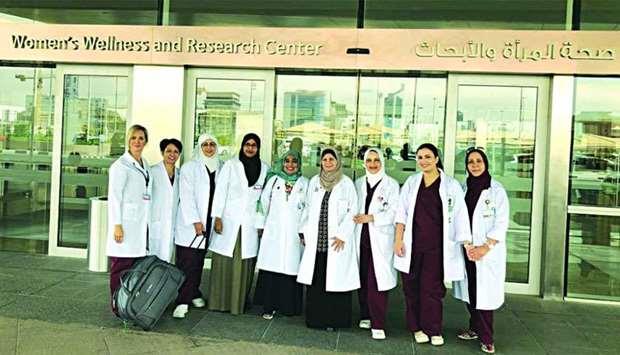
Qatar- 1,200 mothers benefit from postnatal home care
The programme, the "first of its kind" in Qatar, is based on international best practice and adapted to support the local community, HMC has said in a statement.
It aims to provide postpartum care to women and their babies within the comfort of their own home in the days or weeks following the birth of their baby. While there are plans to expand the service, it is currently only available to new mothers who have a high-risk pregnancy or caesarean delivery.
'A key feature of the service is providing important information to new mothers, identifying when additional support is needed, and intervening when required. Our team of four midwives conducts an average of 200 visits per month, with eight to 10 visits each day, said Sister Haila Swaid Salim, executive director of Nursing, WWRC.
Salim said during the postpartum period new mothers and their newborns are vulnerable, both physically and emotionally. She said providing support during this time can help in the early detection and diagnosis of postnatal complications.
'The early detection of postnatal complications has resulted in improved patient outcomes. We have been able to assist women who were experiencing post-delivery complications to get timely and appropriate referrals to specialist care and we have also helped new mothers navigate the various care services available to them, Sister Salim said.
She said the midwives are supporting mothers and their newborns to safely transition from hospital to home by identifying and preventing many common maternal and newborn health issues. She said the home visits can also help boost new moms' confidence, especially with first-time mothers.
'The programme is doing exactly what it was intended to do, which is helping new mothers address many of the common issues encountered during the early postpartum period by tailoring the care to each patient. The use of a postnatal care pathway has been shown to be the best way of providing individualised care for mothers and babies, according to international guidelines by the World Health Organisation and the UK-based NICE programme (National Institute of Clinical Excellence), said Sister Salim.
In addition to increasing patient satisfaction and supporting the safe early discharge of new mothers and their babies, Salim said the programme has helped reduce hospital readmission rates through the early identification of complications and prompt referral of patients to appropriate community health service providers, including mobile doctors. She said the programme has also resulted in reduced incidence of postpartum infections by providing reassessment of C-section wounds and follow-up instruction on wound care.
According to Salim, the programme has been well received by patients, with one Qatari mother who was struggling to breastfeed and who had a newborn with infant jaundice praising the knowledge of the midwives.
Another new mother who used the service said it alleviated many of her concerns and gave her more confidence in her own abilities.
The topic of 'Understanding and Advancing Patient Safety at Home' will be featured in a learning session at the upcoming Middle East Forum on Quality and Safety in Healthcare. The session will be jointly presented on March 24 by Dr Tejal Gandhi, Dr Hanadi al-Hamad and Nadya al-Anzi. More details can be found online at MEF2019.hamad.qa.

Legal Disclaimer:
MENAFN provides the
information “as is” without warranty of any kind. We do not accept
any responsibility or liability for the accuracy, content, images,
videos, licenses, completeness, legality, or reliability of the information
contained in this article. If you have any complaints or copyright
issues related to this article, kindly contact the provider above.


















Comments
No comment